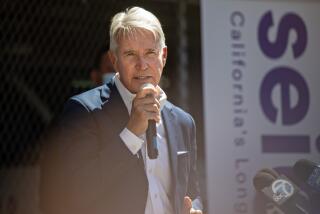Ted Stevens’ charges dismissed as judge excoriates prosecutors
- Share via
WASHINGTON — A federal judge Tuesday ordered a highly unusual criminal inquiry of prosecutors in the case against former Sen. Ted Stevens, delivering a blistering rebuke of the Justice Department’s actions and asserting that its failures extended beyond the inability to give the Alaska Republican a fair trial.
In dismissing the public corruption case against Stevens, U.S. District Judge Emmet G. Sullivan railed against a government agency that he said had committed unprecedented missteps in a feverish quest to secure the senator’s conviction.
“In nearly 25 years on the bench, I have never seen anything approaching the mishandling and misconduct I have seen in this case,” Sullivan told a packed Washington courtroom.
Atty. Gen. Eric H. Holder Jr. last week asked Sullivan to void the case after he learned that federal prosecutors had failed to turn over evidence to the lawmaker’s defense team. But the judge went a step further -- assigning a private lawyer to investigate six attorneys from the Justice Department’s public integrity section.
Although the department has initiated its own inquiry, Sullivan said the instances of misconduct were “too serious and too numerous” to be left to an internal investigation that has “no outside accountability.” Lawyer Henry Schuelke will submit a report to the court recommending whether members of the trial team should be held in criminal contempt. If not exonerated, they could be fired, disbarred or even jailed.
“It is a blow to have Sullivan say he doesn’t trust the Justice Department to do that work,” said Michael Bromwich, who served as the department’s inspector general during the Clinton administration. “That is a very significant black eye.”
In a CBS television interview Tuesday, Holder said the Justice Department was “fully capable” of investigating itself, but added that the agency would cooperate with Schuelke’s inquiry. He said the prosecutors involved would remain at the department for now.
The revelation that prosecutors had withheld notes from an interview with a key prosecution witness that could have helped Stevens’ case came on the heels of a series of scandals that have plagued the Justice Department in recent years -- including allegations two years ago that the firing of several U.S. attorneys nationwide was politically motivated.
Bromwich said that the Stevens case, along with the U.S. attorneys scandal, would damage the credibility of prosecutors in federal courtrooms. “The people I feel sorry for are the line prosecutors across the country,” he said.
Sullivan linked the government’s actions in the Stevens case to its stance concerning terrorism suspects being held by the U.S. military in Guantanamo Bay, Cuba. For weeks, the judge has been complaining that the Justice Department withheld evidence concerning a Yemeni detainee whose case was before Sullivan until the Obama administration ordered his release last month.
“Whether you are a public official or a private citizen or a Guantanamo detainee,” the judge said, “the government has an obligation to produce exculpatory evidence so that justice can be done.”
He asked Holder to retrain all federal prosecutors on their evidence-handling practices, and called on his fellow federal judges nationwide to crack down on prosecutorial misconduct.
A jury in October found Stevens, 85, guilty on seven corruption counts. A week later, the veteran lawmaker lost his bid for reelection to the seat he had held for 40 years. Immediately afterward, his lawyers moved to have the verdict set aside, citing prosecutorial misconduct.
Joseph E. diGenova, U.S. attorney for the District of Columbia under President Reagan, said that the Stevens case was “not an isolated incident.”
“It’s part of a pattern of misconduct,” DiGenova added. “The department and U.S. attorneys are out of control.”
As an example, DiGenova -- a Republican who now works as a defense attorney in Washington -- cited the bribery prosecution of former Democratic Gov. Don Siegelman of Alabama.
“They don’t do justice anymore,” DiGenova said. “They get people.”
But a former high-ranking Justice Department official in the Bush administration, who asked that his name not be used because he knows the lawyers under investigation, said that the problem was confined to those who ran the Stevens prosecution.
“This to me is not an institutional issue,” the former official said. “The U.S. attorney firings was an institutional issue.”
Stevens was convicted of accepting gifts and services from oil and construction interests in his home state and then lying about it on his Senate financial disclosure forms. He spoke briefly during Tuesday’s hearing, thanking Alaskans for their support, and said that Sullivan’s actions had restored his faith in the rule of law.
His lawyer, Brendan V. Sullivan Jr., who is not related to the judge, had stronger words.
“It’s clear from the evidence that the government engaged in intentional misconduct,” Sullivan said. “Nothing really can be done to rectify the wrong. Nothing can be done to give the citizens of Alaska a senator they surely would have elected.”
After the hearing ended, Stevens’ wife and daughters escorted him to a van outside the courthouse. “I’m going to enjoy this wonderful day,” he said.
--
More to Read
Sign up for Essential California
The most important California stories and recommendations in your inbox every morning.
You may occasionally receive promotional content from the Los Angeles Times.










